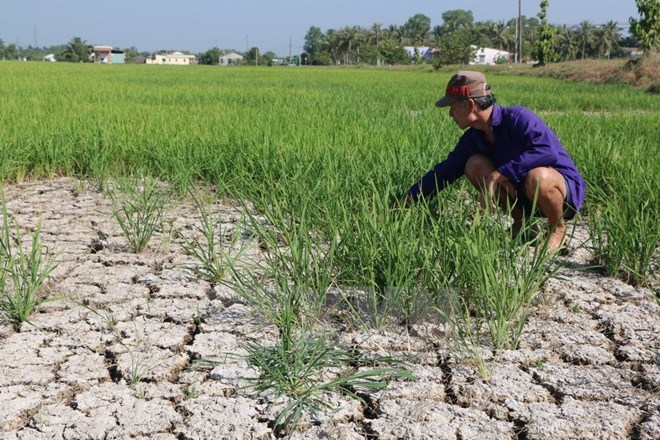Vietnam’s commitments under the Paris Climate Agreement have been implemented in the provinces and cities in the Central and Central Highlands regions.

On July 28, the Ministry of Natural Resources and Environment (MONRE) held a conference in Hoi An city, in the central province of Quang Nam, in order to implement the Paris agreement in the two regions. The event gathered scientists, experts and representatives from 20 localities in the Central and Central Highlands.
The Paris agreement was adopted by the member states at the 21st Conference of the Parties to the United Nations Framework Convention on Climate Change (COP 21) in 2015. It is the first global legal document regulating the responsibilities in responding to climate change of all parties.
The focus of the agreement is the introduction of regulations relating to the responsibility for the nationally determined contributions and implementation by each party to the UN Framework Convention on Climate Change (UNFCC). So far, the agreement has been signed by 195 countries and ratified by 155, among a total of 197 parties to the UNFCC. The Paris agreement officially came into effect on November 4, 2016.
Vietnam has affirmed its commitments to join the international community in responding to climate change, accelerating negotiations and the adoption of a post-2020 global climate agreement, as well as calling on countries to come up with an agreement, with fair contribution and equitable assurances among countries, in terms of mitigation, adaptation, finance, development and technology transfer.
By 2020, amidst difficulties in resources, Vietnam remains committed to actively implement strategies, programmes and plans to respond to climate change in many areas, with practical measures and responsibilities in implementing its obligations under the UNFCC.
Speaking at the conference, Deputy Minister of Natural Resources and Environment Vo Tuan Nhan said that the event aimed to discuss up-to-date information on climate change and its impacts to the Central provinces and the Central Highlands, implementation of the Plan on Implementation of the Paris Agreement, and the development of specific implementation plans for tasks assigned under the Prime Minister's Decision No. 2053/QĐ-TTg, dated October 28, 2016.
Among the 20 provinces and cities in Central Vietnam and the Central Highlands, Da Nang, Khanh Hoa, Lam Dong, Nghe An, Quang Binh and Quang Ngai have developed and issued their plans to implement Decision No. 2053 on the Paris agreement implementation. Praising the local efforts and activeness, Deputy Minister Nhan expressed his wish that the above locales would share their experiences with others to ensure the effective performance of the tasks set by the PM.
At the conference, managers and experts in the field of climate change discussed their experiences in responding to climate change, such as state management on climate change; the impact of climate change and climate change adaptation in Quang Nam; climate change scenarios and the impact of climate change on the Central Highlands region; provincial planning to implement the Paris agreement; and mitigating greenhouse gas emissions in order to implement the National Plan on Implementation of the Paris Agreement.
As a locality hard hit by climate change and sea level rise, Le Tri Thanh, Deputy Chairman of Quang Nam People's Committee said that climate change is a global issue, so it is impossible for each locality to implement a single response plan.
Vietnam's participation in the Paris agreement and the implementation this agreement is extremely urgent, he said, urging the relevant agencies and localities to continue to closely coordinate and support natural resource and environmental management work, as well as climate change response in Quang Nam in particular and in the two regions in general.
According to Head of MONRE’s Department of Meteorology, Hydrology and Climate Change (DMHCC) Nguyen Van Tue, to adapt to climate change, it is necessary to strengthen and improve the quality of socio-economic development planning, towards modernity and sustainability, while reviewing the master plans for economic development, especially in the sectors that have a great impact on natural resources and the environment, whilst strengthening pollution control and waste management.
To improve the development of the provincial plan to implement the Paris agreement, Nguyen Van Huy, Head of DMHCC’s Office for Science, Technology and International Cooperation, suggested that the relevant provinces and cities review and select related tasks assigned in the Decision No. 2053, as well as reviewing the approved documents, programmes and projects in response to climate change and related to green growth and identifying appropriate content to continue to be implemented, in addition to adjusting and adding tasks.
As one of the countries most severely affected by climate change, Vietnam has been proactive in actively building its Intended Nationally Determined Contribution (INDC) on climate change response and submitting the plan to the Secretariat of the UNFCC in September 2015.
According to Vietnam’s INDC, with domestic resources, the country commits to reducing greenhouse gas emissions by 8% by 2030 compared to conventional development plans and would reduce the figure to 25%, if in receipt of international support. At the same time, Vietnam will undertake adaptation activities to increase its resilience to climate change, enabling it to contribute further to mitigating greenhouse gas emissions.